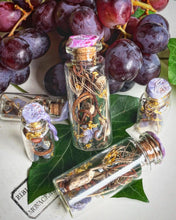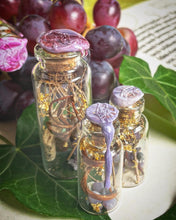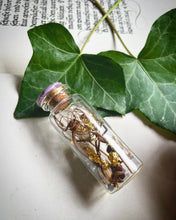These reliquaries were made in ritual this past Sunday evening, and contain materials that evoke particular aspects of Dionysus. For his associations with wine and related freedom from inhibitions: grape agate and grape vine tendrils. For his famous thyrsos: pieces of wild dried fennel stalk and bulb from Cyprus. And since gold is frequently associated with Dionysus (from his wine cup, to his clothing, to the many references to his beautiful “golden” curls): bits of genuine gold-foil.
More on the Thyrsos: while popularly understood as a pine-cone tipped staff, the Dionysian thyrsos actually varied a good bit in descriptions and function across ancient sources. It is sometimes referred to as pine, but is also oftentimes referred to as being made of fennel (the stalks and bulbs of wild Grecian fennel are quite large!), and there is even some thinking that the thyrsus used by officiants and participants in the Dionysian festivals and rituals might have been made of artichoke heads and their long stalks. It’s entirely possible that all of these materials were used at some point, perhaps depending on the materials most easily foraged by the particular participants.
A more personal note on Dionysus: as someone raised in the RCC, and who relatively recently became “post-Catholic,” I’ve been working a lot of late to deconstruct a lot of things I’d been told to understand as fundamental truths, one of which being the need to reject/feel bad about/apologize for the desire for/enjoyment of earthly pleasures in their many attending forms. In the process of learning more about Dionysus, I was particularly struck by how he is popularly understood as a the god of hedonism and overindulgence, and how incorrect that understanding of him is. He is a much more nuanced and liminal figure than that, and the ancient sources that discuss him tend to emphasize as much. He is both chthonic and Olympian, a god of earthly pleasures and divine ecstasy, a god of wine and of the grapevine, he is a god closely associated with the heady powers of the natural world and their attending joys. And so, my little hope with these strands and these reliquaries is that they serve as a helpful and encouraging reminder to be unashamed about the things that bring you pleasure and joy, whatever they are.






